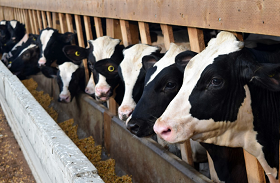
Guelph ON - There are only a limited number of livestock medicines approved for use in veal cattle, due to the small size of the sector and the high costs associated with securing label requirements.
Veal Farmers of Ontario (VFO) has accessed funding through the Canadian Agricultural Partnership (the Partnership) for a study evaluating the safe use of meloxicam, a pain relief and anti-inflammatory medication, in grain-fed veal production.
The product is currently approved for use in dairy and beef cattle, but not for veal as a withdrawal interval – the length of time that must pass after the animal’s last treatment with a drug before it may be safely processed for food – has not been established.
This means that although veterinarians may prescribe Meloxicam to treat veal cattle, they have to do so “extra label” and establish an appropriate withdrawal time with the guidance of the Canadian Global Food Animal Residue Avoidance Databank (CgFARAD).
“There is currently no research around the use of meloxicam in veal cattle, and this project will help in establishing a safe meat withdrawal time for use of this product,” says Kendra Keels, VFO’s Industry Development Director. “Animal welfare is a key priority for veal farmers in Ontario and the ability to use meloxicam will improve the welfare of animals being treated; the better they feel, the sooner they return to feed and thrive after an illness.”
Two University of Guelph professors, Dr. Ron Johnston and Dr. Dave Renaud are leading the study and through CgFARAD, the results will be made available to veterinarians across the country.
Meloxicam is one of the priority products where the veal industry would like to see the bovine label claim – uses approved for use in dairy and beef cattle – extended to include veal cattle as well. This aligns with VFO’s commitment of improving animal welfare and reducing antimicrobial use, as well as ensuring a high level of food quality and safety.
“This project is very important to our industry and as a very small sector, we would not be able to conduct a study of this nature without support from the Partnership as it would simply be beyond our available budget,” adds Keels.
This project was funded in part through the Canadian Agricultural Partnership (the Partnership), a federal-provincial-territorial initiative. The Agricultural Adaptation Council assists in the delivery of the Partnership in Ontario.
Source : adaptcouncil